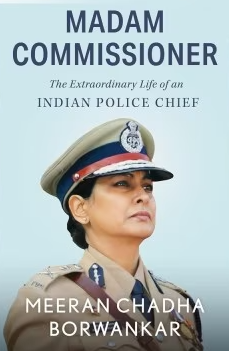Encounters With Politicians By Anil Swarup
"Anil Swarup's book, 'Encounters With Politicians,'
explores his experiences in dealing with politicians, offering insights into
governance challenges."
"Encounters With
Politicians" by Anil Swarup provides a revealing glimpse into the inner
workings of Indian politics through the eyes of a seasoned bureaucrat. Anil
Swarup, known for his candid observations and direct approach, shares his
firsthand experiences and interactions with various politicians during his
distinguished career.
The book is structured
around Swarup's encounters with politicians from different parties and
backgrounds, offering readers a diverse perspective on the political landscape
of India. Swarup's narrative is not only informative but also introspective, as
he delves into the complexities and challenges of governance in a diverse and
dynamic democracy.
Through his anecdotes and
insights, Swarup portrays politicians as multifaceted individuals driven by
ambition, ideology, and the relentless pursuit of power. He sheds light on the
intricacies of policymaking, negotiations, and the sometimes murky world of
political maneuvering.
One of the book's
strengths lies in its ability to humanize politicians, presenting them as both
protagonists and antagonists in the larger drama of governance. Swarup's
balanced portrayal encourages readers to look beyond stereotypes and appreciate
the nuances of political decision-making.
Moreover,
"Encounters With Politicians" serves as a valuable resource for
anyone interested in understanding the intersection of bureaucracy and politics
in India. Swarup's lucid writing style and pragmatic approach make complex
issues accessible to a wide audience, from students of political science to
seasoned professionals in public administration.
Overall, Anil Swarup's
"Encounters With Politicians" offers an insightful and
thought-provoking exploration of Indian politics, enriched by his years of
experience at the highest levels of government. It stands as a testament to the
author's commitment to transparency and accountability in public service,
making it a compelling read for anyone curious about the dynamics shaping
modern India's political landscape.
"Meeran Chadha's 'Madam Commissioner' is a memoir
detailing her journey and challenges as a female civil servant in India."
"Madam Commissioner" by Meeran Chadha
presents a compelling narrative of her journey as a woman police officer in
India, navigating through the complexities of law enforcement and societal
expectations. Chadha's memoir provides a rare insight into her experiences,
challenges, and triumphs in a predominantly male-dominated field.
The book begins with Chadha's early aspirations
and the hurdles she faced in pursuing a career in the police force. She
recounts her determination to break stereotypes and carve a path for herself in
a profession typically dominated by men. Through her personal anecdotes and
reflections, Chadha offers a glimpse into the inner workings of law enforcement
agencies and the intricate balance between justice, politics, and public service.
As Chadha rises through the ranks, she confronts a wide array of cases ranging from petty crimes to high-profile investigations. Each chapter in the book unfolds with gripping accounts of her encounters with criminals, victims, and colleagues, highlighting the harsh realities and moral dilemmas faced by law enforcement officers.
"Madam Commissioner" also delves into
Chadha's efforts to bring about systemic reforms within the police force,
advocating for gender equality, and enhancing community policing initiatives.
Her commitment to upholding the rule of law and serving the public interest
shines through in her narratives, inspiring readers with her resilience and
dedication.
Overall, Meeran Chadha's memoir is a testament to her courage, integrity, and passion for justice. It not only chronicles her personal journey but also offers valuable insights into the broader social and political landscape of contemporary India. "Madam Commissioner" is a must-read for anyone interested in law enforcement, gender equality, and the complexities of modern policing in a diverse and evolving society.
The Ultimate Goal By Vikram Sood
"The Ultimate Goal" by Vikram Sood explores India's intelligence agencies, their challenges, and their impact on national security.
"The
Ultimate Goal" by Vikram Sood is a thought-provoking exploration of
India's national security challenges in the contemporary geopolitical
landscape. Sood, a seasoned intelligence professional, draws upon his extensive
experience to offer insights into the strategic threats and opportunities
facing India today.
The
book begins by analyzing the evolving nature of national security, emphasizing
the importance of understanding both traditional and non-traditional threats.
Sood delves into issues such as terrorism, cyber warfare, espionage, and the
impact of global power dynamics on India's security calculus.
One
of the key themes in "The Ultimate Goal" is India's quest for a
secure and prosperous future amidst regional rivalries and global
uncertainties. Sood argues that achieving this goal requires a comprehensive
approach that integrates military strength with diplomatic finesse, economic
resilience, and technological innovation.
Throughout
the book, Sood provides historical context and contemporary examples to
illustrate his points, making complex geopolitical concepts accessible to a
wide audience. He examines India's strategic partnerships, its role in regional
alliances like SAARC and ASEAN, and its diplomatic engagements with major
powers such as the United States, China, and Russia.
Moreover,
"The Ultimate Goal" offers policy recommendations aimed at
strengthening India's national security apparatus and enhancing its strategic
capabilities. Sood advocates for reforms in intelligence gathering, defense
procurement, and counterterrorism measures to safeguard India's interests in a
rapidly changing world.
Overall,
Vikram Sood's "The Ultimate Goal" is a comprehensive guide to
understanding India's national security challenges and aspirations. It serves
as a valuable resource for policymakers, scholars, and anyone interested in
geopolitics, providing a nuanced perspective on the complex interplay of
security, diplomacy, and strategy in the 21st century.

















